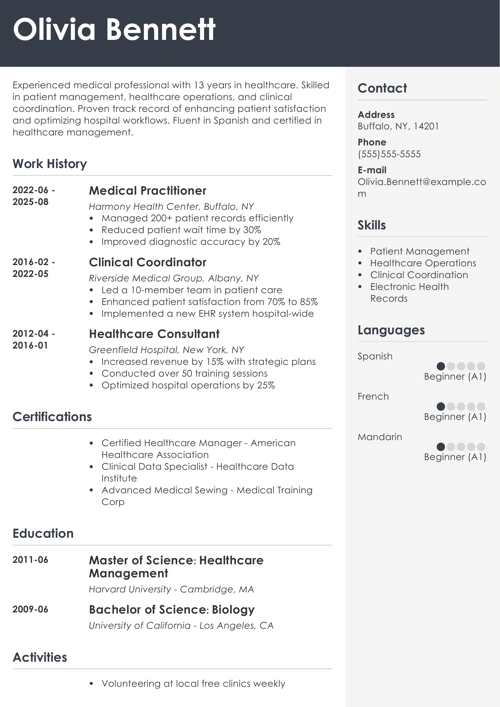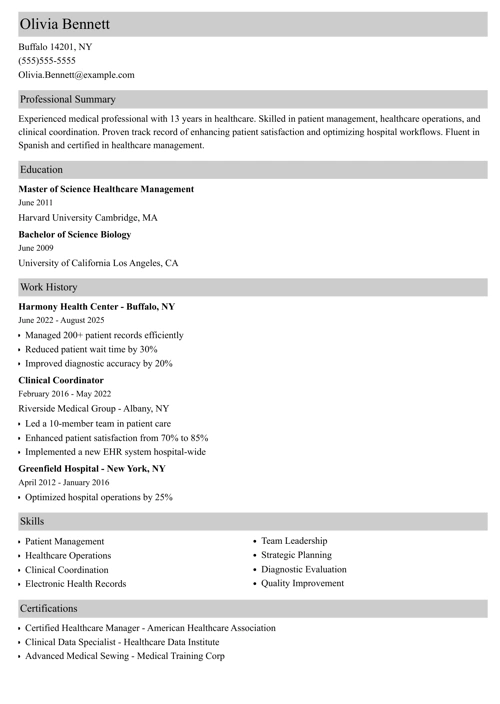After years of study, all medical professionals should have great jobs. Ones that pay well, offer a comfortable work environment and respect from administration as well as patients. But, let’s face it—not all jobs are like that. And those working in the medical field must fight hard to avoid shady clinics that might ruin their reputation forever.
Luckily, we’ve compiled a collection of medical resume examples and templates for a variety of jobs in the medical field. Just jump to the medical resume template you need!
Want to save time and have your resume ready in 5 minutes? Try our resume builder. It’s fast and easy to use. Plus, you’ll get ready-made content to add with one click. See 20+ resume templates and create your resume here.
Sample resume made with our builder—See more resume examples here.
If you want to check out a general, multi-purpose medical resume, scroll down one fold to see a pitch-perfect example we’ve written.
For more specific samples with resume writing hacks from industry insiders, see one of our dedicated guides:
- Medical Assistant Resume
- Medical Administrative Assistant Resume
- EMT/Paramedic Resume
- Doctor Resume
- Medical Technologist Resume
- Nursing Resume
- Pediatric Nurse Resume
- Labor and Delivery Nurse Resume
- Healthcare Administration Resume
- Professional Resume Examples
Medical Resume Sample
Dr. Olivia Bennett, MD
Medical Doctor
(555) 234-5678
olivia.bennett@email.com
linkedin.com/in/dr-olivia-bennett
Summary
Board-certified medical doctor with 10+ years of experience in patient diagnosis, treatment, and preventive care. Skilled in internal medicine, chronic disease management, and emergency care. Passionate about providing high-quality healthcare and improving patient outcomes through evidence-based medicine. At Hope Medical Center, led a diabetes management program that reduced hospital readmission rates by 20%. Eager to apply clinical expertise and compassionate care to enhance patient health and wellness at Summit Health Group.
Experience
Primary Care Physician
Hope Medical Center, Chicago, IL
July 2014–February 2025
Key Qualifications & Responsibilities
- Diagnosed and treated a wide range of acute and chronic conditions in patients of all ages.
- Developed personalized treatment plans focused on preventive care and long-term patient wellness.
- Ordered and interpreted laboratory tests, imaging studies, and other diagnostic procedures.
- Educated patients on lifestyle modifications, medication adherence, and disease prevention.
- Spearheaded a diabetes management program, reducing hospital readmission rates by 20%.
Key Achievement
- Recognized for exceptional patient care, leading to a 30% increase in patient retention and referrals.
Resident Physician (Internal Medicine)
Johns Hopkins Hospital, Baltimore, MD
July 2011–June 2014
Key Qualifications & Responsibilities
- Conducted thorough patient assessments, managed complex cases, and developed comprehensive treatment plans.
- Collaborated with specialists in cardiology, endocrinology, and infectious disease to optimize patient care.
- Participated in clinical research projects, presenting findings at national medical conferences.
- Assisted in training medical students and junior residents in internal medicine protocols.
Key Achievement
- Awarded "Outstanding Resident of the Year" for excellence in patient care and leadership.
Education
Doctor of Medicine (MD)
Harvard Medical School, Boston, MA
September 2007–June 2011
Bachelor of Science in Biology
University of California, Los Angeles (UCLA), Los Angeles, CA
September 2003–May 2007
Skills
- Patient Diagnosis & Treatment Planning
- Chronic Disease Management
- Emergency & Urgent Care
- Preventive Healthcare & Patient Education
- Medication Management
- Evidence-Based Medicine
- Electronic Medical Records (EMR) & Documentation
- Team Collaboration & Leadership
Certifications
- Board Certified in Internal Medicine, American Board of Internal Medicine (ABIM), 2015
- Advanced Cardiovascular Life Support (ACLS), American Heart Association, current
- Basic Life Support (BLS), American Heart Association, current
- Licensed Physician, State of Illinois, License No. MD123456
Awards
- Outstanding Resident of the Year – Johns Hopkins Hospital, 2014
- Patient Care Excellence Award – Hope Medical Center, 2021
Memberships
- Member, American Medical Association (AMA)
- Member, American College of Physicians (ACP)
- Member, Society of General Internal Medicine (SGIM)
Interests
- Telemedicine & Digital Health Solutions
- Clinical Research & Medical Innovation
So you’ve seen a clinically perfect medical resume sample. Time to learn the best strategies for making your medical resume equally impressive.
Here’s how to write a medical resume step by step:
1. Choose the Best Medical Resume Template
Think about medical charts, neatly catalogued into folders. It’s easy to find what you’re looking for in them, isn’t it?
The reason for that is good organization.
Think about this when writing your medical office resume. Recruiters need to find what they’re looking for in a flash. Help them do it easily.
Format your resume for medical field this way:
- Create a professional resume header: include your name and contact details, such as your phone number, email, and LinkedIn profile.
- Choose one of the three standard resume formats: usually, the reverse-chronological resume template will work to your biggest advantage. It shows your strongest suits first.
- Pick a professional resume typeface and make sure the structure of your resume is elegant and readable.
- MS Word of Adobe PDF file format for a resume? Unless the job ad says otherwise, go for the PDF file format. It keeps your resume design and layout intact.
Pro Tip: How long a resume is too long? If you’re writing an entry-level resume for medical jobs, keep it one-page. For more experienced candidates, it’s better to have multiple pages than to omit important career details.
2. Write a Resume Objective or Resume Summary
It’s that short blurb at the top of your medical professional resume. It’s also known as a professional resume profile.
Craft it the way you’d write an elevator speech. Make it a “trailer” for the rest of your job application. Give a sneak peek of your top accomplishments.
Got relevant experience under your belt? Write an introductory summary statement. Briefly summarize your career and mention 2–3 of the most important professional achievements.
Writing a medical resume with little experience? Open with a job objective. List a few of the skills you’ve mastered so far and say how you’re going to translate them into your employer’s success.
Whichever one is right for you, don’t focus it on why you want the job. Explain why they should want to give the job to you.
For bonus points, name-drop the medical institution you’re applying to. Statistics show that 63% of recruiters value resumes that are customized and personalized.
Pro Tip: While this part comes at the top of a professional medical resume, write it last. Create the rest of your resume first. Then, skim the cream.
3. Create the Perfect Medical Resume Job Description
Here’s what will truly make or break your chances of landing that dream position: medical job description on your resume’s work history section.
A good one will leave a lasting impression.
Make it sloppy, though, and it will mean to the hiring manager as much as the 100th branded pen she got from another medical sales rep.
Here’s how to nail a medical resume work experience section:
- Start with your most recent work. Follow it with previous positions in reverse-chronological order.
- Include: job title, company name, dates of employment and no more than 6 bullets outlining your medical duties and achievements.
- Pack your job descriptions full of action words and “power verbs.”
- Use numbers whenever you can. Quantified metrics validate your worth.
- Customize each resume you sent to match the requirements from the job ad. Don’t list every single medical responsibility. Highlight what’s relevant to the position.
Pro Tip: Wondering what your next big career break might be? Consider this: reports have shown that employment in the home health care sector is going to grow the fastest (60% in the next 8 years). Employment in hospitals, in turn, is likely not to expand at all.
4. Make Your Medical Resume Education Section Shine
If you’re wondering how to list your degrees on a resume, here’s some good news—
It’s usually the easiest part:
- Include just the highest degree of education.
- List your degree, minor, the educational institution, and graduation year.
If you don’t have higher education, don’t worry. An equivalent of a high school diploma will do.
Writing a medical resume with no experience? Add extra details to your education section: additional activities, favorite fields of study, student organizations, and so on.
5. Highlight Your Medical Skills
This is how to make the most of your medical resume skills section:
- Start with a spreadsheet. List all key qualifications and skills you have. Include hard skills, as well as soft skills. Don’t forget about specific technical skills either.
- Go back to the job ad. Note down skills the employer expects. Use these skill-related keywords on your resume for medical office.
Need inspiration? Check out this medical resume sample skills list.
Medical Skills for a Resume: Examples
- Patient Assessment
- Office Skills
- Customer Service
- Taking Vital Signs
- Medical Administrative Skills
- Patient Care
- Recording Patient Medical History
- Phlebotomy Certificate
- Administering Injections
- TB Test Clearance
- Documentation
- Organizational Skills
- Details Oriented
- Phone Skills
- Teamwork Abilities
- Communication Skills
- Foreign Language Proficiency
- Nursing Skills
Don’t just file all your skills in the skills section. Mention some in your resume profile. Pepper the most important ones onto your job descriptions: this way, your medical resume conveys a consistent message.
Insights from 11 million resumes crafted with our builder show that:
- The typical resume for a Medical Doctor includes 16 skills.
- Skills such as health assessments, patient diagnosis, treatment plan development, and preventive care are top choices for Medical Doctors.
- The average resume length for Medical Doctors is 2.5 pages..
All this information is becoming hard to process? Don’t worry. Our resume tool is here to help you out.
Making a resume with our builder is incredibly simple. Follow our step-by-step guide, use ready-made content tailored to your job and have a resume ready in minutes.
When you’re done, our professional resume builder will score your resume and our ATS resume checker will tell you exactly how to make it better.
6. Add Other Sections to Your Medical Resume
The sample medical resume sections above? Every good resume has to have them.
But you’re not writing “just” a good medical resume. You’re writing a great one. So punch it up a notch by including one (or some) of these extra resume items:
- Certifications
- Volunteer Work
- Conference Participation
- Hobbies and Interests
- Awards and Accolades
Pro Tip: If you have a medical license, put in next to your full name in the resume header, for instance: “Jane Smith, RN” or “Mark Stephens, CMA.”
7. Attach a Cover Letter to Your Medical Resume
Who cares about a cover letter nowadays?
Well—
Over half of recruiters. So you should too.
You can double your chances of getting hired by writing a good application letter for a resume.
Here’s how:
- Start with learning how to format a cover letter in accordance with the formal business letter etiquette.
- Open your cover letter with an impressive fact about your professional self.
- Focus on how your skills will help achieve your employer’s goals.
- Finish a cover letter with a clear and strong call to action.
- Don’t make your cover letter too long. All you need is 200–250 words.
Pro Tip: Once you submit your medical resume with a covering letter, don’t just sit and wait. After two weeks without response, write a job application follow-up email.
Plus, a great cover letter that matches your resume will give you an advantage over other candidates. You can write it in our cover letter builder here. Here's what it may look like:
See more cover letter templates and start writing.
Visit our guide to learn even more about writing resumes for thos specific positions:
- Phlebotomy Resume
- Veterinarian Resume
- Caregiver Resume
- Physician CV
- CNA Resume
- Dental Assistant Resume
- Dental Hygienist Resume
- Sonographer Resume
- Nursing Student Resume
- New Grad Nursing Resume
- Med-Surg Nurse Resume
- Charge Nurse Resume
- ICU Nurse Resume
- OR Nurse Resume
- Nurse Practitioner Resume
- NICU Nurse Resume
- LPN Resume
- Speech Pathologist Resume
- Medical Billing Resume
- Radiologic Technologist Resume
- Medical Technologist Resume
- Travel Nurse Resume
- RN Nursing Resume
About Zety’s Editorial Process
This article has been reviewed by our editorial team to make sure it follows Zety's editorial guidelines. We’re committed to sharing our expertise and giving you trustworthy career advice tailored to your needs. High-quality content is what brings over 40 million readers to our site every year. But we don't stop there. Our team conducts original research to understand the job market better, and we pride ourselves on being quoted by top universities and prime media outlets from around the world.





